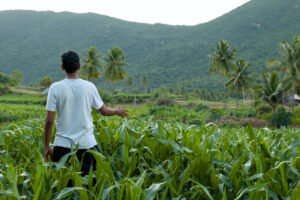The F&A Next 2022 summit in Wageningen, the Netherlands, next week will spotlight 12 startups as the “new heroes of food and agtech.” The event is nearly sold out but you can grab any last remaining tickets – at a discount with code AFN22 – here.
These startups are solving some of the food system’s most pertinent problems, ranging from food wastage to farm management issues, and are providing solutions in alternative protein, indoor agriculture, food delivery, and gene-editing in plants.
AFN had a look into what they’re up to. Below you’ll meet the first six; tune in tomorrow for the second half-a-dozen.
OneSoil
OneSoil is a Swiss company offering precision farming tech to farmers in Europe and the Americas. OneSoil helps them improve the productivity and sustainability of their operations with data-driven solutions.
The company offers the OneSoil app, OneSoil Yield app for variable rate application (VRA) trials, and a B2B analytics service. These help farmers monitor field conditions remotely, optimize field scouting and proactively solve issues in problem areas; VRA helps in reducing fertilizer usage.
OneSoil is now on a mission to accelerate its user growth, boost data collection for better ML models, and grow its B2B revenue. The platform is also looking to strengthen its position in North America this year.
“As use of data in agriculture is not quite mature, there is a high demand for easy-to-use solutions that do not require any special training,” says CEO Morten Schmidt. “We are closing the gap for an easy-to-use, app data-based solution for any farmer. We are creating analytics and knowledge that make data visible and thereby allows for faster decision-making for the business.”
Orderlion
Even though the food industry is one of the largest in the world, many suppliers and wholesalers along the agrifood value chain still rely heavily on older technologies, like fax and answering machines, to handle daily orders from their customers.
Stefan Strohmer, CEO and co-founder of Orderlion, observed that restaurants placed orders from their suppliers in inefficient, non-standardized ways, and launched a B2B SaaS platform to solve this.
It is available in Austria, Germany, Switzerland, and the UK.
“Given additional price pressure and their need to optimize their internal processes, restaurants are turning to their suppliers for more efficient and easy-to-use ordering options. For suppliers, making this transition has been hard, because they often do not have the resources, time, or technical expertise to take a generic solution available on the market and adapt it to their own business,” Strohmer says. “We have developed a digital solution that fits their specific needs and that is easy to set up, offering them a simple and low-risk tool.”
Plantik
Plantik is leveraging genome-editing technology to cut down the time taken to develop new plant varieties. “Genome-editing technologies are powerful, but their application in different industries is just kicking off,” says Ying Shao, co-founder and CEO, Plantik Biosciences.
Plantik is currently operating in Europe and is eyeing the US market. But the startup has faced market entry hurdles as some countries still need to build regulatory frameworks that separate genome-edited crops from GMOs.
It has so far made successful genome-editing attempts in hemp and is starting work on other crops, too.
“We see a strong need to build good tools for the next-generation ‘plant engineers’ who will be creating plants for making better and new foods, preventing natural disasters, cleaning the air, the soil, and our cities, and so many new uses,” Shao says.
Microharvest
Demand for alternative proteins is surging, with some projecting it to be worth $127 million by 2028.
“Everybody speaks about the increased demand for protein in 2050, but already today about 690 million people globally are undernourished. We should not replace the current food system; we should make it better,” says Katelijne Bekers, CEO and co-founder of Microharvest.
This biotech company is using bacteria to develop healthier alt-proteins, faster. Bacteria can contain up to 70% protein; can be grown in a tank, taking up less space compared to plant and animal sources; and can be used in human food, pet food, and animal feed.
“Acceptance of bacteria as a source for protein has not been a hurdle so far. It is clear that companies are on the lookout for alternative protein sources, and are open to explore bacteria-based ones if that can address their needs,” Bekers says.
Pivotal
Businesses are looking for ways to become ‘nature positive’ and balance their impact on the environment. But measuring changes in biodiversity is difficult, as traditional methods of doing this are slow and tough to scale.
According to Pivotal, agriculture is the main source of biodiversity loss on land globally.
“The nature and climate crises are interlinked. We cannot solve either in isolation and we cannot solve the nature crisis simply by sequestering carbon,” says Cameron Frayling, the startup’s co-founder.
Pivotal uses machine learning and other technologies to accurately measure biodiversity at scale. These measurements can then be turned into credits based on real, measured gains in biodiversity. According to the startup, this is one way to create value in nature restoration – and could be a powerful tool in many areas of the world to finance environmental projects.
Frayling says people respond more positively to the concept of biodiversity credits, which Pivotal calls ‘Nature Uplifts,’ than carbon credits.
“Our view is that monitoring [biodiversity change] is not optional,” he says. “Without it, how do you know the outcomes for nature of your actions?”
Ekonoke
Climate change’s rising temperatures and prolonged droughts are leading to the decimation of certain types of crops. One that’s under particular threat is hops: the flowers that give beer its distinct bitterness and aroma.
“If the climate emergency continues to accelerate, growing regions will be further reduced and eventually using real hops to make beer may be a luxury very few can afford, while others turn to synthetic substitutes,” says Ines Sagrario, co-founder and CEO of Ekonoke.
The startup has developed indoor growth recipes for multiple hops varieties and is improving selection bioprocesses to ensure maximum yield and high quality, and to safeguard biodiversity. While most indoor ag companies grow leafy greens and berries, Ekonoke focuses on hops – claiming the crop requires a customized approach.
It can grow hops in three to four cycles per year, in a pest and disease-free environment without the need for chemicals.
Ekonoke claims to have achieved varieties that are 30-40% better in quality compared to outdoor grown hops varieties. While he accepts that some consumers may be disappointed their hops aren’t grown using traditional methods, Sagrario believes that the startup can win them over by explaining “the huge climate risk that outdoor hops face, and the strict sustainability criteria that we follow in order to grow our indoor hops.”





